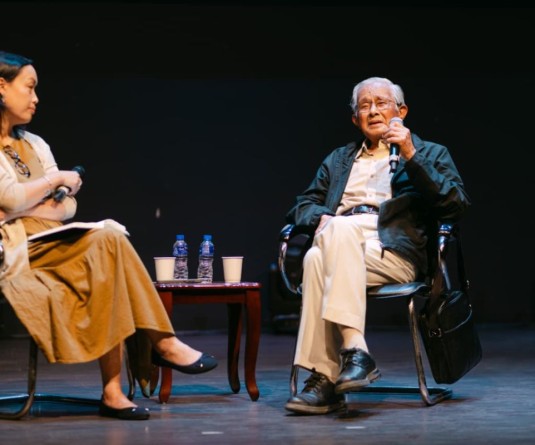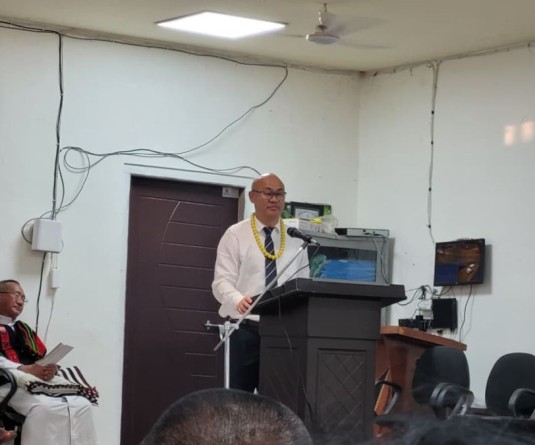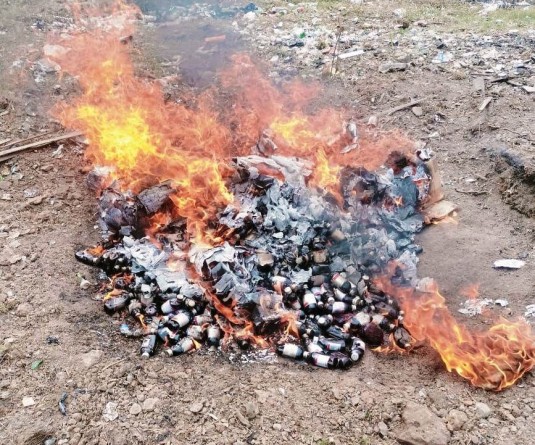
‘Healing does not follow a schedule,’ says Union on temporary pass system post-FMR
Meluri, April 9 (MExN): The Pochury Students' Union (PSU) has strongly condemned the extension of the Armed Forces (Special Powers) Act, 1958 (AFSPA) in various districts and police station jurisdictions across Nagaland, including Meluri District.
The Union also expressed concern and firm opposition to the Government of India's (GoI) decision to scrap the Free Movement Regime (FMR) and the proposed construction of a border fence along the Indo-Myanmar border.
The Union Ministry of Home Affairs (MHA) has recently notified the extension of AFSPA for another six months in nine districts of Nagaland, including Meluri, as well as in 21 police stations in other districts, by designating them as “Disturbed Areas” with effect from April 1.
In a press release, the PSU termed the extension “deeply unjust, arbitrary, and detrimental” to the peace and progress of the region.
Accordingly, reiterating its firm stand against AFSPA, the Union affirmed its decision not to extend cooperation of any kind to the Indian armed or paramilitary forces.
The extension of the draconian law is not only a blatant disregard of the ground realities but also an insult to the collective efforts of the people of Nagaland, particularly in the peaceful Meluri region, who have been working tirelessly to foster stability, harmony, and development, it asserted.
The PSU further highlighted that Meluri District, situated in the south-eastern frontier of Nagaland and inhabited predominantly by the Pochury community, is a peaceful region marked by its remote geography, rich cultural heritage, and a people deeply rooted in values of hospitality and non-violence.
Declaring this serene district as a "disturbed area" is not only unjustifiable but also deeply damaging to the morale of its citizens, it said.
According to the Union, the continued imposition of AFSPA has historically subjected the people to arbitrary detentions, unwarranted search operations, harassment, and psychological trauma.
The extension of the Act only revives past wounds and threatens to derail the path of peaceful coexistence and community-led progress that Meluri has steadily pursued, it maintained, adding that it stigmatises the region and fuels mistrust between civilians and security forces, undermining the basic tenets of democracy and justice.
Already grappling with developmental challenges due to its remoteness and poor connectivity, the district does not deserve further alienation through the militarisation of civilian spaces, it asserted.
The PSU also noted that the Act not only hampers socio-economic development but also discourages youth engagement, education, and tourism — all critical for the growth of a frontier district like Meluri.
Thus, it urged the GoI and MHA to immediately revoke the “unjust notification” and adopt a more humane, just, and democratic approach towards addressing issues in the North-East.
The people of Meluri and the larger Naga community yearn for peace, not oppression, it added.
Border measures ‘impractical and gravely unjust’
Meanwhile, expressing its firm opposition to the scrapping of the FMR and the proposed construction of a border fence along the Indo-Myanmar border, the PSU stated that these measures threaten to sever longstanding bonds of kinship, culture, and coexistence shared by border communities on both sides.
The people living in the border belt share not just land but lives, and are bound by intermarriages, common ancestry, and mutual traditions, it pointed out.
These are ties that predate modern borders and reflect a unique identity built on harmony and trust, it added.
Terming the measures a bureaucratic barrier that is both ‘impractical and gravely unjust,’ the PSU expressed serious concern over the current practice of issuing temporary passes at Avakhung by the 39 Assam Rifles.
Even those seeking medical attention are granted entry for only seven days, as if healing follows a schedule, it highlighted, adding, “Can complex surgeries or long-term treatments be completed within such a limited timeframe?”
The Union further asserted that for Naga people residing along the Indo-Myanmar border, this “so-called international boundary has never divided us — it has always been one shared homeland.”
Forcing people to seek a ‘border pass’ simply to visit their own relatives or access resources is deeply offensive and akin to asking for permission to move within one's own house, it maintained.
The introduction of the system has placed an unfair burden on the border population, disrupting lives and dismantling centuries of coexistence, it added.
Thus, the PSU stated that the current policy disregards the daily realities of the border population, and the proposed fencing of the border will “only intensify our isolation, destroy our socio-cultural fabric, and bring untold hardships upon communities that have lived as one for centuries.”
“We are not intruders — we are one people living in shared ancestral lands arbitrarily divided by a modern line,” it added.
Accordingly, the PSU conveyed strong opposition to the scrapping of the FMR and rejected any move towards border fencing in the region.
True security is built not on walls and fences, but on trust, friendship, and inclusive development, and we wish to continue living in peace and harmony — not behind fences, but alongside our neighbour, held a statement issued by PSU President Rongley Leyri and General Secretary Sasietho.






